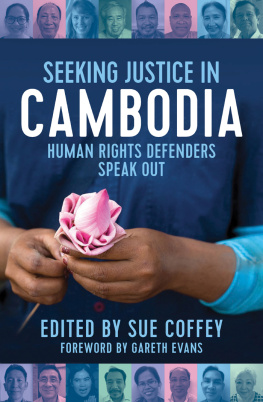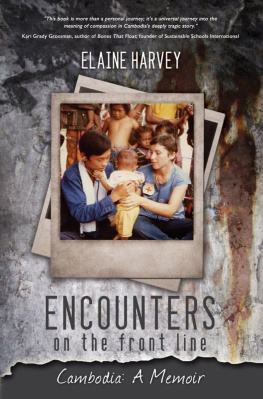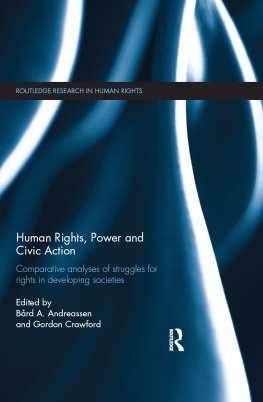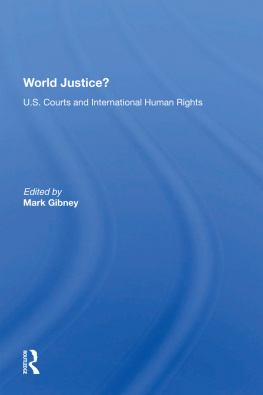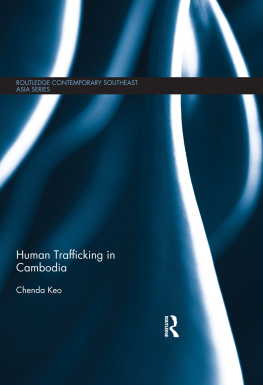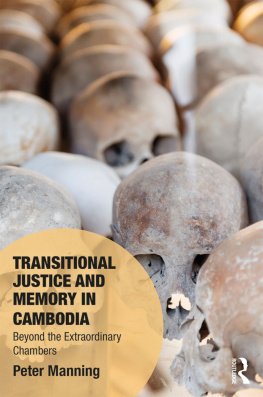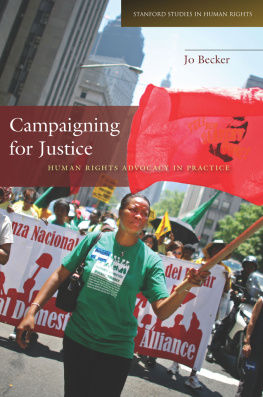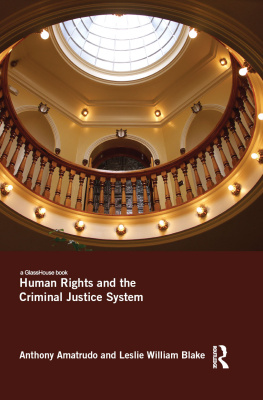Sue Coffey is a writer and communications specialist who has worked in a wide range of roles across government and not-for-profit sectors. She has strong interest and experience in human rights issues, having worked in communications in these areas both in Australia and overseas. In 201213 she worked in Cambodia for the Australian Governments overseas aid program, as communications advisor to the NGO Forum on Cambodia, a peak body in Phnom Penh working for human rights for all Cambodians. She then moved to Myanmar, where she was communications advisor to the Myanmar Governments education reform program until 2015. Prior to these roles she worked in a diverse array of senior advisory and policy roles in the Victorian Government, peak bodies and not-for-profit organisations. All of the roles in which she has worked have taught her the importance of working towards a just and equitable world, in which all people have access to human rights and fair distribution of resources.
SEEKING JUSTICE IN
CAMBODIA
HUMAN RIGHTS DEFENDERS
SPEAK OUT
EDITED BY SUE COFFEY
FOREWORD BY GARETH EVANS
MELBOURNE UNIVERSITY PRESS
An imprint of Melbourne University Publishing Limited
Level 1, 715 Swanston Street, Carlton, Victoria 3053, Australia
www.mup.com.au
First published 2018
Text Sue Coffey and the individual contributors, 2018
Design and typography Melbourne University Publishing Limited, 2018
This book is copyright. Apart from any use permitted under the Copyright Act 1968 and subsequent amendments, no part may be reproduced, stored in a retrieval system or transmitted by any means or process whatsoever without the prior written permission of the publishers.
Every attempt has been made to locate the copyright holders for material quoted in this book. Any person or organisation that may have been overlooked or misattributed may contact the publisher.
Typeset in Minion 11/14pt by Cannon Typesetting
Cover design by Philip Campbell Design
Printed in Australia by McPhersons Printing Group
9780522873290 (paperback)
9780522873306 (ebook)
9780522875010 (ebook in Khmer)
For Ben
and for all Cambodians,
now and in the future
Contents
Gareth Evans
Sue Coffey
Interviews
A Leading Member of the United Nations Transitional Authority in Cambodia, 199093, and UN Special Representative to Cambodia, 199497
Founder and President of the Cambodian Human Rights Development Association (ADHOC)
Founder and President of the Cambodian League for the Promotion and Defense of Human Rights (LICADHO)
Executive Director of the Committee for Free and Fair Elections in Cambodia (COMFREL)
Executive Director of Hagar International and Former Executive Director of The NGO Forum on Cambodia
Founder and Executive Director of SILAKA
President of the Cambodia National Rescue Party (CNRP)
Government Minister for Human Rights
Founder and Executive Director of Future Forum
Buddhist Monk and Human Rights Activist
Founder and Independent Radio Broadcaster for Beehive Radio
Executive Director of the Cambodian Center for Human Rights (CCHR)
Monitoring Manager for the Cambodian League for the Promotion and Defense of Human Rights (LICADHO)
Coordinator of the Workers Information Center
Land Evictee from Boeung Kak Lake
UN Special Rapporteur on the Situation of Human Rights in Cambodia
FOREWORD
Gareth Evans
Seeking Justice in Cambodia is an important book. It records the stories of some extremely significant Cambodians who established the first human rights organisations in Cambodia in the wake of the signing of the Paris Peace Agreements in 1991 and the establishment of the United Nations Transitional Authority in Cambodia (UNTAC) in 1992. Through a series of absorbing interviews, Sue Coffey follows the careers and experiences of those early founders, and adds the stories of younger human rights leaders in Cambodia today. These people have taken the struggle for human rights from the early 1990s to the present, and some are still leading the organisations they founded. Their mission has been to achieve human rights for all Cambodians, and they are still fighting for this goal. Their commitment deserves the attention and support of the wider world.
Cambodias journey has been a long and harrowing one. Before the signing of the Paris Peace Agreements, the country was on its kneesravaged successively by massive US bombing, civil war, the Khmer Rouges genocidal reign of terror, invasion by the Vietnamese, and by civil war again. These onslaughts caused the deaths of some two million Cambodians and effectively destroyed the lives of many more.
The Khmer Rouge took over Cambodia in 1975, in the wake of the collapse of the US-backed Lon Nol administration, which had deposed Prince Norodom Sihanouk in a bloodless coup in 1970. To reach their goal of comprehensively transforming Cambodian society, the Khmer Rouge were responsible for the deaths of between one quarter and one third of the populationby outright execution or through starvation, illness and overwork. They particularly targeted intellectuals, the petit bourgeois, and those with religious affiliations and connections to the previous government. But executions became increasingly indiscriminate and included high-ranking cadres and members of the armed forces as mistrust and instability within the regime grew.
The Vietnamese invasion in the closing days of 1978 drove the Khmer Rouge out of the capital and brought an end to its genocidal reign of terror. It also witnessed the rise of Hun Sen, who became prime minister in 1985 and has continued in this role for thirty-two years, becoming one of the longest-serving heads of government in the world. But the Vietnamese arrival triggered a new civil war, with the Khmer Rouge still armed and active. Continual military fighting, guerilla assaults and ambushes, widespread displacement of peoplewith hundreds of thousands still in border refugee camps, unable to return homeand political repression, meant that life for the majority of Cambodians in the 1980s remained fraught.
The continuing conflict was complex and intractable. It was played out at three distinct levels. The first involved the four competing internal parties, with Hun Sens government ranged against the anti-communist United National Front for an Independent, Neutral, Peaceful and Cooperative Cambodia (FUNCINPEC) of Prince Sihanouk and the Khmer Peoples National Liberation Front (KPNLF) of Son Sann, and the militarily still powerful communist Khmer Rouge. Each group intensely mistrusted the others. The second level was regional, with Vietnam supporting Hun Sens government, and Association of Southeast Asian Nations (ASEAN) supporting his opponents. The third level involved the global powers, with China supporting the Khmer Rouge and Prince Sihanouk, the Soviet Union supporting Hun Sen, and the United States supporting the two non-communist resistance groups. Complicating matters further, throughout the 1980s Cambodias seat at the United Nations (UN) was held by a coalition of the two royalist parties and the Khmer Rouge, as the UN refused to recognise the government imposed by the Vietnamese as legitimate.

